NEWSLETTER
Table of Contents:
Irene Käosaar:The keywords for this academic year are quality, methodicalness and innovation
September sees 2560 people commence free studies of Estonian
Sing and cook your way to fluency in Estonian!
Language clubs and cafés are open to new members!
Let one of our advisers help you on your language-learning journey
Social workers can now practise their Estonian on business trips
Best practice guidelines published on teaching Estonian to adults
Watch the language-learners’ rap opera Karma online!
Support meetings to resume for those returning to Estonia
Registration open for international conference on integration
This year’s Citizens Day quiz to be held from 16-27 November
Open calls for tenders and calls for proposals
Irene Käosaar:The keywords for this academic year are quality, methodicalness and innovation
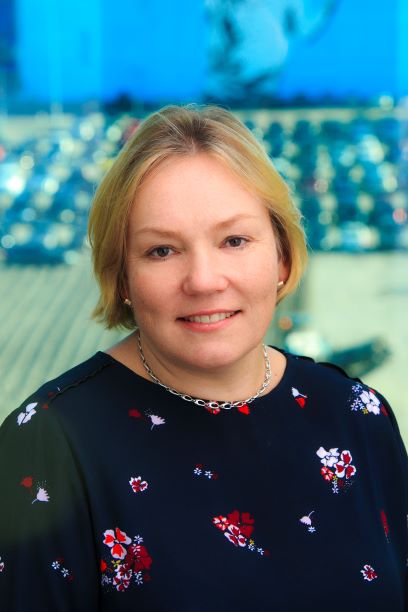
It goes without saying that the 1st of January is a significant day on the calendar, but the year really begins for most in September. We’re no exception – as autumn lends the landscape its trademark golden hue, our Estonian Language Centres have opened their doors for a third consecutive year of learning!
This colourful time of year got off to an up-tempo start for the foundation with the rap opera Karma. Driven by its energy, we’ve set ourselves goals for the year ahead: to analyse the impact our activities have and to boost quality across the board. For us that means taking yet another step closer to our partners, our students and everyone else who takes part in our activities to make sure we’re doing what’s most important and most likely to result in cohesion in society, of which people are left feeling like they’re valued and vital members.
In a number of ways, Karma is a milestone marking a new stage in the teaching of Estonian, with new groups and students, new teaching methods and formats and new questions and answers.
For the Estonian Language Centres run by the Integration Foundation, it’s full steam ahead this academic year. Whereas last year we were still stoking the engine, this year everything’s up and running, and we’re offering students a wide-ranging repertoire of language-learning services. We now have a full complement of crew, with five new teachers joining us in autumn. Language courses and exciting events are taking place in our language centres on a daily basis, giving everyone interested the chance to practise their Estonian. We’re also continuing to try out new language-learning formats. We’re offering more help and advice all the time to those who are eager to start or continue learning the national language, working with them to put together a suitable (and doable) study plan.
In cooperation with the Ministry of Culture and the advisory committees of the Estonian Language Centres, we’ve drafted best practice guidelines for the teaching of Estonian to adults that are rooted in modern approaches to learning and in the best experiences of language-teaching. These guidelines are a starting point not only for our own teachers and those championing integration in our regional centres, but all language school teachers running courses on the basis of procurements organised by the Integration Foundation. Since we have years of experience in teaching Estonian to adults and using a wide variety of methodologies, we have no hesitation in recommending that other agencies and organisations teaching the language to adult learners follow these same principles.
The keywords for us for this academic year are quality, methodicalness and innovation: we are constantly working to improve ourselves so that everyone who comes to us can get the help they need; we use modern, effective methods that help language-learners achieve their goals; and we’re open to new ideas and prepared to try things out to help spread Estonian even further.
Happy new academic year!
Irene Käosaar, Integration Foundation director
September sees 2560 people commence free studies of Estonian
 Registration in August for the free Estonian language courses run by the Integration Foundation led to a total of 2560 adults taking up studies in September. There will be a further opportunity to register for courses in January, when the foundation will be offering more than 1000 additional places.
Registration in August for the free Estonian language courses run by the Integration Foundation led to a total of 2560 adults taking up studies in September. There will be a further opportunity to register for courses in January, when the foundation will be offering more than 1000 additional places.
Studies have commenced on 160 courses at the A1, A2, B1, B2 and C1 levels. The courses are being held in Tallinn, Narva, Maardu, Keila, Tartu, Pärnu, Sillamäe, Jõhvi, Kohtla-Järve and Ahtme.
Each course lasts for at least 120 academic hours, with lessons being held 2-3 times per week. The courses comprise classroom lessons, field trips, independent work and other activities supporting language-learning, including games.
The courses are being run by the language schools selected as part of the project procurement.
Free Estonian language studies for adults are financed by the Ministry of Culture.
Sing and cook your way to fluency in Estonian!
Hedvig Evert and Anna Farafonova, the heads of the Integration Foundation’s Estonian Language Houses in Tallinn and Narva, outline the opportunities that are available at the centres this academic year for people to practise their Estonian.
How has the new academic year started for your centre?
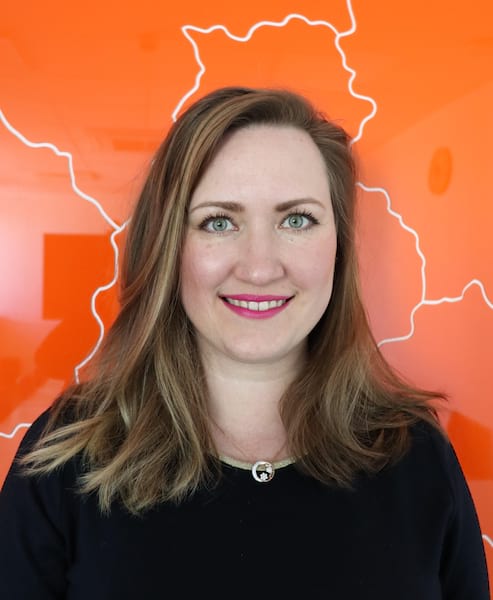 Hedvig Evert: Here in Tallinn our autumn season’s got underway with 309 students divided up between 20 groups. We opened courses at the A1, A2 and B1 levels. We now have eight teachers, since two newcomers have just joined us. We’ve now got an Activities Coordinator as well, who at the moment is overseeing Language Roulette, the Language Friends project and our volunteer programme, as well as establishing partnerships in Tallinn, Tartu, Pärnu and Narva and, from here on in, taking more and more responsibility for coordinating supporting activities in and around the centre. The textbooks we use were delivered early, so thanks to that, and to the exciting language-learning games we play and our timetable having fully taken shape, things have started really well for us.
Hedvig Evert: Here in Tallinn our autumn season’s got underway with 309 students divided up between 20 groups. We opened courses at the A1, A2 and B1 levels. We now have eight teachers, since two newcomers have just joined us. We’ve now got an Activities Coordinator as well, who at the moment is overseeing Language Roulette, the Language Friends project and our volunteer programme, as well as establishing partnerships in Tallinn, Tartu, Pärnu and Narva and, from here on in, taking more and more responsibility for coordinating supporting activities in and around the centre. The textbooks we use were delivered early, so thanks to that, and to the exciting language-learning games we play and our timetable having fully taken shape, things have started really well for us.
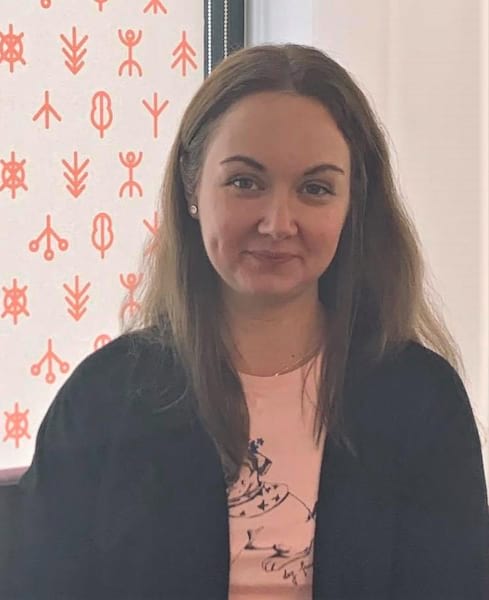
Anna Farafonova: We’ve got 13 groups this autumn, at every level from A1 to C1, one of which is a special pronunciation class for teachers of Estonian as a second language from kindergartens in Narva. We have around 200 students at the moment all up. We’ve been joined by three new teachers as well, meaning we now have eight in total.
Our biggest and best-known project so far this academic year is the rap opera Karma, which premiered on 19 September. Its cast of 30 were all language-learners who had no previous stage experience. At the Estonian Language Centre, here and in Tallinn, we’re always looking for exciting new ways to teach and learn the language, and that’s how we came up with the idea of learning Estonian through acting and rap. I’m really delighted with what we achieved – I was so proud to see how confident the students were on stage, rapping in Estonian in front of a live audience.
What excitement do visitors to your centre have to look forward to in the coming months?
Hedvig Evert: By the time our first lessons started we’d put together a timetable of activities and events supporting language-learning that proved popular in the past but had to be discontinued in spring because of COVID. So we’re back offering things like workshops on folk culture and cooking and ceramics, our ‘Key to Estonian’ conversation classes for parents, our book club and our ‘Media 24’ classes. We’ve also introduced a range of new activities, like virtual Language Roulette, a cooking and culture club in Pärnu we’ve called ‘Foods of the Peoples of the World’, a game that involves hiking in the forest, field trips to the Estonian Open Air Museum to explore the holiday traditions of Estonians, conversation classes for both beginners and more advanced speakers, Museum Fridays and meet-and-greets with interesting guests. In November we’ll also be launching a programme of Estonian-language films in cooperation with the Sõprus cinema, where screenings will be followed by discussions led by actors from the films themselves.
Anna Farafonova: There are lots of fun events happening here in Narva as well, which are always popular among our students. We’re starting a great new weekly series of meet-and-greets, each Wednesday, with interesting guests, plus we’ll be running film or game nights, and we’re planning to organise family events as well. We had a mini-film festival in September, which we ran in cooperation with the Matsalu Nature Film Festival, showing nature films and hosting discussions on environmental themes. Once a month, on Saturdays, we’re also running Estonian culture workshops with the help of the Folk Culture Centre. Plus we’re working with TalTech’s Virumaa college to put on film nights in Kohtla-Järve, board game nights and ‘language watcher’ meetings for those who study Estonian on their own and then go over their results with a supervisor. Tandem studies are continuing in Kohtla-Järve and Sillamäe as well. We had a tandem camp in summer actually – native speakers of Estonian got together with native speakers of other languages and they all spent a week learning one another’s languages. That led to the idea of setting up a tandem choir, which is in the planning stages at the moment.
Take a look at the timetables of events designed to allow people to practise their Estonian:
Language clubs and cafés are open to new members!
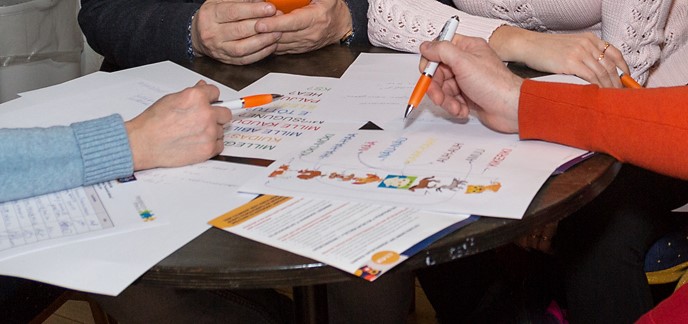 Estonian language cafés and Estonian language and culture clubs represent an additional opportunity for those interested in learning the national language to hone their skills and practise the spoken language.
Estonian language cafés and Estonian language and culture clubs represent an additional opportunity for those interested in learning the national language to hone their skills and practise the spoken language.
Language cafés
The cafés offer an opportunity to practise Estonian in a relaxed environment outside of the classroom. They are designed for those who want to build up their courage and self-assurance in using the language or analyse how they are learning the language and gain support in it. The café format is best suited to those who are unable to take part in regular lessons each week and would rather study independently. The cafés take place year-round all over the country: Tallinn, Keila, Maardu, Paldiski, Jõhvi, Kiviõli, Kohtla-Järve, Narva, Narva-Jõesuu, Sillamäe, Tapa, Haapsalu, Pärnu, Tartu and Valga.
You can attend any café as and when you are able and inclined to do so.
Take a look at the timetable and fill in the participation form on the Integration Foundation website.
Estonian language and culture clubs
The clubs are designed primarily for those who already speak Estonian at the Intermediate or a more advanced level but who need more practice and encouragement in order to communicate in the language more freely. They are ideal for those who want to practise their Estonian so as to better speak it at the B2 or C1 levels or to prepare for the spoken part of the B2 or C1 exams.
The clubs are open to anyone aged 18 and over who has passed the state exam in Estonian at the B2 or C1 level or at the Intermediate or Advanced level (see §39 of the Language Act) and has a certificate to prove it.
The list of the clubs that are set to open is being constantly updated, with registration on the Integration Foundation website.
The Integration Foundation organises language cafés and language and culture clubs as part of the European Social Fund project ‘Terms and conditions of the provision of support for activities promoting integration in Estonian society’.
Let one of our advisers help you on your language-learning journey
 The Integration Foundation offers advisory services to adults who wish to learn Estonian, helping them choose the options that are best suited to them.
The Integration Foundation offers advisory services to adults who wish to learn Estonian, helping them choose the options that are best suited to them.
Such consultations are primarily geared towards those who are:
- looking to start or continue studying Estonia but who need advice on the formats and options that are available and most likely to suit them;
- hoping to enrol on a free Estonian language course but who are unable or unwilling to register via the Integration Foundation website during the registration rounds that take place 2-3 times per year; or
- looking to study Estonian independently and need information on what options are available to them.
The advisers at the Integration Foundation’s Estonian Language Centres help to analyse each person’s needs and experience, determine their current language level and draw up a suitable study programme. As a result of such a consultation, the person has the chance to join one of the free Estonian courses offered by the foundation if it is felt that this is the learning format best suited to them. In this case, the person does not have to register for the course as part of the public online registration round.
Our advisers can also be contacted over the phone or on Skype.
In addition, our advisers can provide information and guidance on other issues related to integration and adaptation, including relevant services and support.
To register for a consultation, contact our advisers by e-mailing info@integratsiooniinfo.ee or calling the free hotline 800 9999.
Answers to general questions about language-learning opportunities and basic information about living in Estonia can also be found on our councelling web.
Our advisory services are financed via the European Social Fund project ‘Terms and conditions of the provision of support for activities promoting integration in Estonian society’.
Social workers can now practise their Estonian on business trips
 Starting in October, the Integration Foundation is offering 30 social workers from Tallinn, Harju County and Ida-Viru County whose mother tongue is a language other than Estonian the chance to take part in language practice on business trips. This almost month-long project is open to social and care workers and officials from local government agencies and institutions who speak Estonian at least at the beginners’ level.
Starting in October, the Integration Foundation is offering 30 social workers from Tallinn, Harju County and Ida-Viru County whose mother tongue is a language other than Estonian the chance to take part in language practice on business trips. This almost month-long project is open to social and care workers and officials from local government agencies and institutions who speak Estonian at least at the beginners’ level.
The project is designed to offer support to the workers and to encourage them to speak Estonian and to take steps to achieve the level of Estonian they need in their work.
The project is open to workers and officials who already speak Estonian at the A2 level as a minimum. The business trips will last for around a month and take place over a period of five months until the end of February 2021.
The trips and language practice may be based in different parts of the country, excluding Tallinn, Harju County and Ida-Viru County. Employers will send their workers on the business trips to fulfil their ordinary roles and duties, but improving their Estonian at the same time. Prior to the trips, the workers will agree with their Estonian teachers on the main aims, needs and methods of their language-learning, with a feasible study plan being drawn up for them. The workers will then practise their Estonian in a social work agency or institution for 20 working days and on two weekends, i.e. for 24 days in total. A period of up to four weeks which the workers spend in their normal workplace is allowed between two 12-day business trips.
The trips will be organised by Juunika Koolitus OÜ, which won the procurement organised by the foundation. More information on taking part in the programme can be found online at https://juunika.ee/keelepraktika or is available by e-mailing keelepraktika@juunika.ee or calling 744 9600.
Best practice guidelines published on teaching Estonian to adults
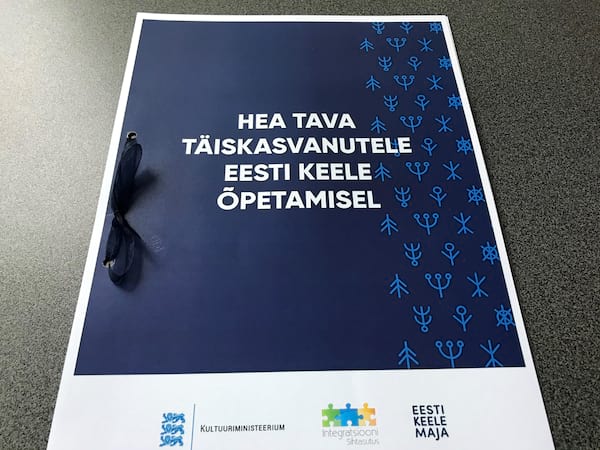 On the initiative of the Integration Foundation and in cooperation with the Ministry of Culture and the advisory committees of the Estonian Language Centres, best practice guidelines were drafted this September for the teaching of Estonian to adults. The guidelines are rooted in modern approaches to learning and in the best experiences of language-teaching.
On the initiative of the Integration Foundation and in cooperation with the Ministry of Culture and the advisory committees of the Estonian Language Centres, best practice guidelines were drafted this September for the teaching of Estonian to adults. The guidelines are rooted in modern approaches to learning and in the best experiences of language-teaching.
These guidelines are a starting point not only for the Integration Foundation’s Estonian Language Centre teachers and those championing integration in its regional centres, but all language school teachers running courses on the basis of procurements organised by the foundation.
“Since we have years of experience in teaching Estonian to adults and using a wide variety of methodologies, we have no hesitation in recommending that other agencies and organisations teaching the language to adult learners follow these same principles,” said Integration Foundation director Irene Käosaar.
The best practice guidelines can be found on the Integration Foundation website.
Watch the language-learners’ rap opera Karma online!
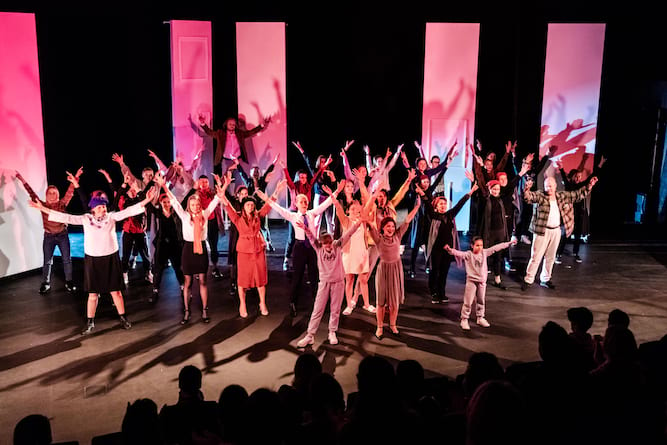
September saw the premiere at the Vaba Lava Narva theatre centre of the rap opera Karma, a unique Estonian-learning project of the Integration Foundation’s Estonian Language Centre in Narva. Most of the cast were Estonian language students from Ida-Viru County who had never previously set foot on stage. Local dancers also took part under the guidance of choreographers from Narva.
Two performances of the opera were given, one of which can now be viewed on YouTube HERE.
Support meetings to resume for those returning to Estonia
 Starting in late October, support meetings will resume for those returning to Estonia in order to help them adapt to life back in the country. Those attending the meetings will have the chance to share practical information and tell one another their stories.
Starting in late October, support meetings will resume for those returning to Estonia in order to help them adapt to life back in the country. Those attending the meetings will have the chance to share practical information and tell one another their stories.
The meetings are designed for Estonians and their families who have returned to the country in the last two years who want to hear about how others have adapted since doing so, share their own concerns and experiences and, where needed, obtain emotional support and the information they need to organise their lives more effectively.
The meetings will be taking place throughout the country, including in Tallinn, Tartu, Pärnu and the Virumaa region.
The get-togethers will be run by experienced group leaders working closely with local governments, thereby supporting adaptation in the community.
The meetings will adopt a free format and last for 2-3 hours, during which everyone who wishes to will get the chance to share their own story and hear about the experiences of others.
During the second half of 2019 a total of 12 such meetings were organised by the Integration Foundation, attended by almost 70 people. The topics most frequently discussed pertained to the Estonian tax system, finding school and kindergarten places for children, registering with family doctors, finding a place to live, career opportunities and difficulties adapting.
The schedule for future meetings will be confirmed in October and posted on the website of the Integration Foundation.
Registration open for international conference on integration
 Registration is now open for the international conference on integration entitled ‘Communication in a Diverse Society: Listening to One Another Despite Our Differences’ that will be taking place in Tallinn on 12 & 13 November. It will bring together internationally recognised experts from Finland, Sweden, Denmark, the Czech Republic, Spain, the United Kingdom and of course Estonia. Should restrictions be in place at the time of the conference due to the health risks posed by coronavirus, the event will take place online.
Registration is now open for the international conference on integration entitled ‘Communication in a Diverse Society: Listening to One Another Despite Our Differences’ that will be taking place in Tallinn on 12 & 13 November. It will bring together internationally recognised experts from Finland, Sweden, Denmark, the Czech Republic, Spain, the United Kingdom and of course Estonia. Should restrictions be in place at the time of the conference due to the health risks posed by coronavirus, the event will take place online.
The two-day conference will feature discussion panels and workshops in which experts, researchers, policy-shapers and participants will debate a range of topics, including cross-cultural communication, media use and shared information space.
To view the programme and register for the conference, go to the event’s website. Attendance is free of charge but requires advance registration.
Some of the presentations are planned to be given virtually. Should the health risks associated with coronavirus lead to restrictions on gatherings being imposed that affect the conference, the event in its entirety will take place online. Information in this regard will be sent to registered attendees at least one week in advance.
The working language of the conference will be Estonian, with simultaneous interpreting into English and Russian.
This year’s event is scheduled to take place on 12 & 13 November at the conference centre at Tallinn’s Song Festival Grounds. It is the seventh conference in the series.
The event is being run by the Integration Foundation in cooperation with the Ministry of Culture.
This year’s Citizens Day quiz to be held from 16-27 November
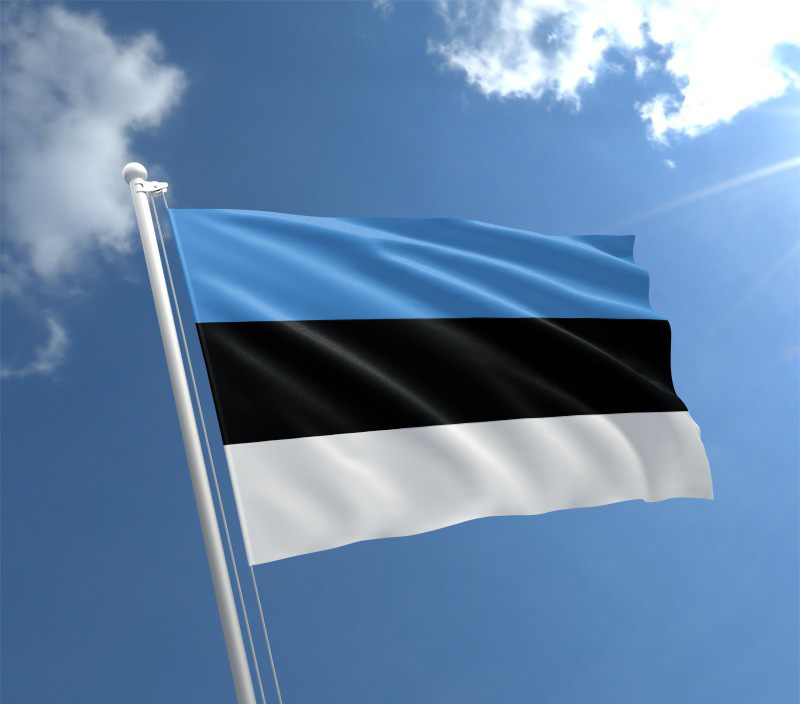 Citizens Day is marked on 26 November, and this year the Integration Foundation is once again organising an exciting online quiz about Estonia’s recent past in honour of the occasion. It will be taking place from 16-27 November, with a focus on interesting events and life in Estonia.
Citizens Day is marked on 26 November, and this year the Integration Foundation is once again organising an exciting online quiz about Estonia’s recent past in honour of the occasion. It will be taking place from 16-27 November, with a focus on interesting events and life in Estonia.
The quiz can be taken on the Integration Foundation website. It will comprise 50 questions in Estonian, with a time limit of 60 minutes. The questions will go live on 16 November.
Everyone who takes the quiz will be able to view the results, should they wish to, via a link e-mailed to them on 28 November.
The Integration Foundation is arranging the quiz for the 18th time this year.
Organisation of the Citizens Day online quiz is supported by the Ministry of Culture.
Open calls for tenders and calls for proposals
Information on the announced calls is published on the Integration Foundation's website at integratsioon.ee/konkursid.
Our calendar
Information on events that take place by our organisation, participation or support, can be found in the calendar published on our website.
Our news
You can read the latest announcements of the Integration Foundation in the news section of our website and on the Facebook page of the Integration Foundation or the Estonian Language House.
